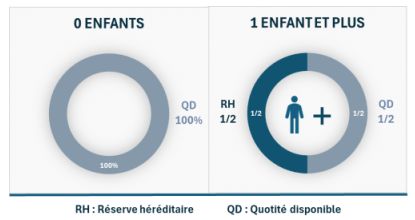The question of forced heirship is the subject of debate in many European countries, where opinions differ on how to reconcile the freedom to dispose of one's property with the protection of the interests of the heirs.
Monegasque law provides forced heirship rights to descendants, which varies according to the number of children, but grants no forced heirship rights to the surviving spouse.

Monegasque private international law deals with the question of forced heirship in a singular way, by making it subject to the national law of the deceased. However, this provision relies on a kind of legislative schizophrenia in article 63 of the Code of Private International Law, which creates legal uncertainty and makes the settlement of successions disproportionately complex.
In comparison, French law grants forced heirship rights to descendants, which varies according to the number of children, and the surviving spouse only has the status of forced heir in the absence of children.

France decided to strengthen the forced heirship of descendants in its legal system, by adopting the law of 24 August 2021 to reinforce respect for the principles of the Republic. This law introduced a new right to compensation (in French, "droit de prélèvement compensatoire"), with the legislator's stated aim of establishing forced heirship as a rule of international public policy. However, this law raises a number of practical difficulties, in particular because of its contradiction with the provisions of the European Regulation on successions n°650/2012.
On the other hand, some neighbouring countries, such as Belgium and Switzerland, have recently chosen to lower the proportion of forced heirship in their law in order to increase testamentary freedom. Belgium introduced a fixed freely disposable portion of ½ regardless of the number of children, while Switzerland limited forced heirship to ½ of the legal rights, regardless of the number of children. These reforms have led to greater testamentary freedom while maintaining a certain degree of protection for heirs.

At European level, the European Court of Human Rights has just stated, in its recent Jarre v. France judgment of 15 February 2024, that forced heirship is not a human right, in line with the Marckx v. Belgium judgment of 13 June 1979, which held that "the right to dispose of one's property constitutes a traditional and fundamental aspect of the right of property".
This ECHR case law will certainly influence the assessment of international public policy rules in the context of the European Regulation on successions.
In conclusion, the question of forced heirship is dealt with differently from one country to another. Some of them strengthen it, while others make it more flexible in order to increase the freedom of choice, in line with the liberal trend in private international law. The legal uncertainty arising from the Monegasque solution, which relies on the national law of the deceased, calls for a legislative reform that would give the legislator the opportunity to consider the place assigned to forced heirship in the Monegasque legal system.
In any case, if you live in the Principality or own a property here, you should secure your future and that of your heirs by entrusting your estate planning to a legal professional who will provide you with tailored advice.
The content of this article is intended to provide a general guide to the subject matter. Specialist advice should be sought about your specific circumstances.



